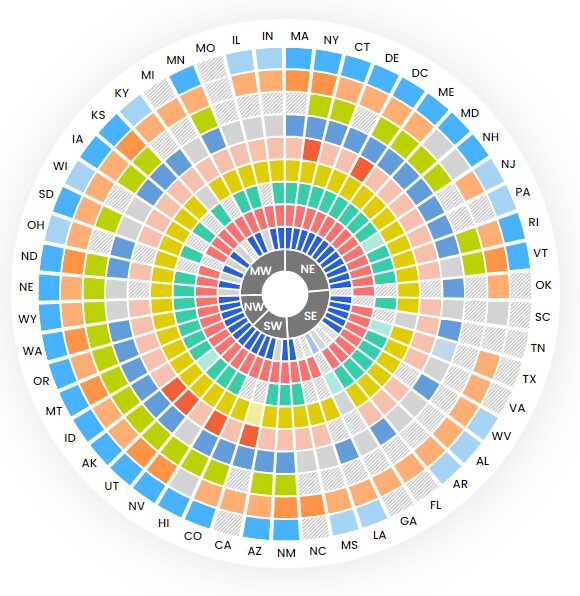
Traveling across state lines to provide critical healthcare services to patients in need is the bread and butter of any locum tenens provider. While nurse practitioners (NPs) and physicians have benefited from interstate medical licensure compacts that make it easy to get licensed in a new state, physician assistants (PAs) haven’t been so lucky—until now. As of October 2024, 12 states have enacted the PA compact, and while the agreement isn’t operational yet, the news is a positive step toward decreasing the barriers PAs face when they travel and practice. Not sure how the PA licensure compact will affect you? Read on to learn more about its provisions, history, and how other similar programs have fared.
What is the PA Licensure Compact?
The PA licensure compact is an interstate arrangement in which participating states agree to recognize a valid, unencumbered PA license issued by another compact state. The compact allows PAs of a member state to forgo the lengthy and complicated PA licensing process of another compact state, meaning they don’t need an individual license from each state they wish to practice in.
As of early October 2024, the PA licensure compact has been enacted by 12 states: Delaware, Utah, Washington, Wisconsin, West Virginia, Nebraska, Virginia, Oklahoma, Maine, Colorado, Minnesota, and Tennessee. Ohio’s governor has also signed legislation enacting the PA compact, which will go into effect on October 24, 2024. Any PA who obtains privilege to practice through the compact must adhere to the laws and regulations of the state in which they work.
When did the PA compact go into effect?
The PA licensure compact officially went into effect among seven states on April 4, 2024, when Virginia Governor Glenn Youngkin signed that state’s bill enacting the compact. Virginia was the seventh state in the United States to adopt the compact, which was the threshold required to activate the agreement.
However, the AAPA says that it could take anywhere between 18 and 24 months to operationalize the compact, meaning PAs must wait until states create the process to administer compact privileges.
What are the overall benefits of the PA licensure compact?
The PA licensure compact eliminates many of the barriers PAs face when looking to practice across state lines, leading to increased patient access to high-quality healthcare. Many healthcare facilities across the country are currently struggling with hiring PAs, so now facilities in compact states have a more streamlined option for onboarding high-quality locum tenens PAs quickly and efficiently.
How does the PA compact affect locum tenens PAs?
For locum tenens PAs in compact states, the licensure compact opens the door to new travel opportunities, greater schedule flexibility, and potentially more money. Since it will become less time consuming and complicated to gain approval to practice in another participating state, PAs can take advantage of the compact to find more work opportunities that meet their personal needs and professional goals instead of being limited to jobs in a select few states.
How is the PA licensure compact similar to the IMLC and NLC?
The PA licensure compact is incredibly similar to the Interstate Medical Licensure Compact (IMLC) and the Nurse Licensure Compact (NLC), as all three are interstate agreements that allow PAs, physicians, and registered nurses (RNs) in participating states to easily gain privilege to practice in another compact state.
One of the biggest differences between the PA licensure compact and these other compacts are in its size. While the PA licensure compact is currently only active in seven states, the IMLC is currently active in 37 states as well as Washington D.C. and Guam, while the NLC is currently active in 42 jurisdictions.
How effective will the PA licensure compact be?
The PA licensure compact is still in its infancy, so it’s hard to predict exactly how effective it will be in increasing patient access to healthcare. However, if it performs anything like its physician and nurse counterparts, the PA compact should make an immense impact on helping patients get the help they deserve.
Just take the IMLC for example—since the compact began in April 2017, over 97,000 licenses have been issued using the IMLCC process. That’s a lot of doctors moving from state to state to provide care!
The PA licensure compact isn’t enacted in my state. Will it be soon?
The answer to this question isn’t so cut and dry—to become part of the compact, a state’s legislature must adopt PA Compact Model Legislation. Some states have filed legislation to enact the compact, including: Maine, New Hampshire, Vermont, New York, Rhode Island, Michigan, Ohio, Tennessee, Oklahoma, and Colorado.
If your state hasn’t enacted or filed compact legislation, you can let your elected officials know that you’re interested in seeing your state become a member of the PA licensure compact.
What do PAs think of the PA compact?
We polled the PAs in our network and asked them this very question—we discovered that 99.7% of PAs support the implementation of the PA licensure compact.
When it comes to the PA compact’s implementation, the vast majority of PAs believe that it’s taking too much time for it to become activated. In our survey, 300 PAs (91%) agreed that the PA compact is taking too long to implement.
Almost every PA we surveyed agreed that the PA compact will increase patient access to high-quality healthcare, with 406 PAs (99%) agreeing with that statement.
This is partly due to the fact that with an active PA licensure compact, it will be easier for PAs to travel from state to state to render care to patients. In fact, most of the PAs surveyed said that they would be more likely to consider working in a different state if there was a PA Licensure Compact.
Start Your Locum Tenens PA Career with Barton
Are you a PA in a compact state? Are you working at a permanent healthcare position and want to broaden your horizons and treat patients in new areas of the country? Check out our job board and apply today to get connected with one of our experienced recruiters.



